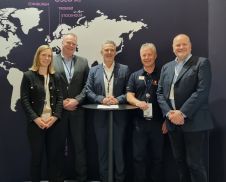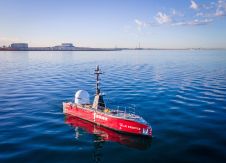Wine Lake, Butter Mountain… Data Ocean
It seems that whichever way I look nowadays I am surrounded by technology and data. Sometimes there is such a huge volume of data that it is inconceivable how anybody can comprehend the ciphers without some form of graphical interpretation.
And here is another area of huge technological advance. Some incredible display options are now available in the marketplace. GPS display systems in our cars, canoes, leisure-craft and most types of cargo and passenger ships. I am afraid some of this technology has created the same sort of problem that we had with the French ‘wine lake’ or the European ‘butter mountain’: a surfeit of data. Is there a name for this too – maybe a 'data ocean'?
The other week, a colleague of mine was commissioned to undertake a review of Information Management in a large multinational company. Although he has worked his whole career with large-volume data management, he was astonished at how much reliance was placed on the accuracy of data made available on a computer screen. There is almost blind faith that the computer is never wrong, especially amongst the younger and less experienced users. With data acquisition being so highly automated, the opportunities for end-users to participate in data collection are very limited. Yet it is this very exposure that allows the end-user to get a 'feel' for data; to realise that the seabed is very rarely 'that funny shape'; to understand that ships cannot put on the brakes in the same way as a car; that poor weather conditions do affect visibility.
I myself recently carried out a review in a former 'east block' country, where the reverse was true. Very little automation had occurred. Most staff had more than 25 years experience (there the phrase 'jobs for life' still holds true) and even new graduates have had only the most basic of training on computer systems. Data volumes were very limited, but the quality of the data was excellent. It is many years since I have put pen to paper to prepare a chart from scratch, but a few days ago I was again able to witness this task being executed.
I feel there must be a happy medium somewhere. Automation is excellent, so long as people are aware of its limitations. (I love the GPS unit in my car and get very frustrated when either the base mapping is incomplete or signal drops out because of high buildings and narrow streets, but at least I am aware of these limitations.) Many people in the world still cannot access the wonders of data manipulation that many of us take for granted.
Education is still needed, practical common sense is still needed, and I trust that real live hydrographers will still be needed for many years to come. Me? I am off to the South of France for some sun and relaxation. I think that I will prefer to plumb the depths of the remnants of this 'wine lake'... see you in the Languedoc.

Value staying current with hydrography?
Stay on the map with our expertly curated newsletters.
We provide educational insights, industry updates, and inspiring stories from the world of hydrography to help you learn, grow, and navigate your field with confidence. Don't miss out - subscribe today and ensure you're always informed, educated, and inspired by the latest in hydrographic technology and research.
Choose your newsletter(s)
























